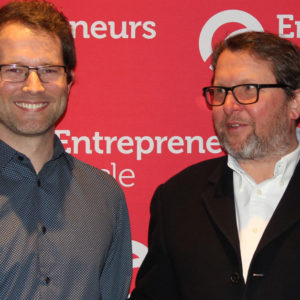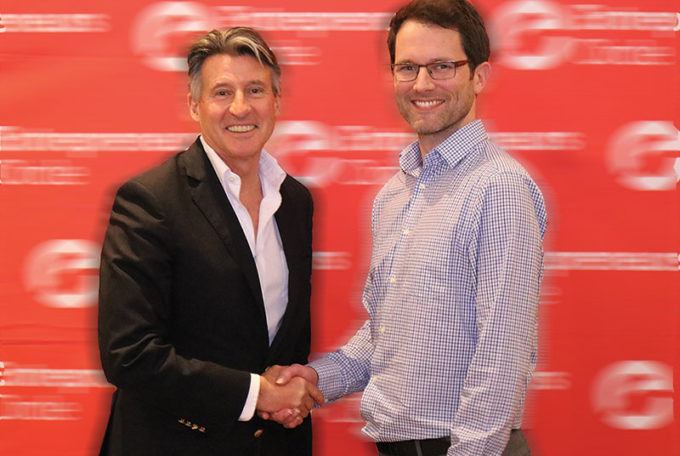Nick Jenkins is best known for being the founder of online greetings card company, Moonpig.
He is a multi-million pound entrepreneur who built up his own business from scratch.
His unique idea for an online greeting card company was created with the help of the internet. Nick was a regular on the BBC show “Dragon’s Den”, which he appeared in from 2015 to 2017, but is now a regular investor of start-up businesses. He offers expert opinions and insights in customer service, business management, innovation, marketing, marketing and sales.
Moonpig was Nick Jenkins’ nickname at school!?
Did you know that? Amusing!
And that’s not the only thing…
Nick’s journey is fascinating.
Nick Jenkins has been on my radar ever since he started on BBC’s Dragons’ Den. So when I heard he would present a Celebrity Masterclass in Birmingham I knew I had to be there.
While driving through the snow from Leamington Spa, near Coventry, I felt excited to learn more about Nick’s Moonpig journey.
Nick Jenkins was the founder and owner of Moonpig.com
I’d previously thought Moonpig.com was an amazing success story. Little did I know they’d nearly gone bust.
Moonpig provides personalised greetings cards–it’s such a great product.
- It had a high gross margin.
- Payment upfront.
- Paying suppliers in 60 days.
It all looked great for Nick. But 4 years in, if something didn’t change they would go bust.
So what did Nick do?

He put their prices up, and not by a tiny percentage, but by a whopping 50%. From £1.99 to £2.99. They manned the computers in anticipation of a flood of emails. They were nervous about plummeting sales.
Can you guess what happened?
People just carried on buying, and only three complaints came in. Yes, that’s right. Only three complaints. As Nick said: “Once you know you have the right product, you need to sell it at the right price.”.
That single price increase helped turn Moonpig into a multi-million pound business.
Other nuggets of wisdom from Nick Jenkins:
- Your company needs a good culture starting at the top.
- Hire good people and let them get on with their job. Do not micromanage them. Realistically, look to keep them for 4-5 years – people move on.
- Get a great understanding of numbers. Don’t leave your accountant to handle the numbers. You need to see monthly management accounts.
- Have your KPIs in front of you and understand the levers you can pull. Your conversion rates. Your CPA ( cost per customer acquisition).
- If you haven’t got much money for marketing then you must understand your website’s analytics. You can then polish your customer’s journey, and not leave money on the table.
On Nick’s last point, there’s a lot you can do to improve your website content – but not all of us have the best writing skills. So consider having a look at this Artificial intelligence copywriting tool called Jasper you can learn more about it here – it’s pretty amazing really, it’s a piece of software that uses artificial intelligence to generate impressive marketing cop, on demand, in under 30 seconds. So you can have an AI tool write all of your marketing copy and content so you can get back to actually working on your business.
Some of the features I like are:
- generating product descriptions
- compelling Facebook ads
- high-converting website headlines
- SEO-friendly blog posts
- Review responses
- and so much more.
It’s impressive how many good reviews this AI tool has. As with any artificial intelligence, there are things to be ironed out, but if used in the right way, I think you’ll be impressed. I don’t think Nick’s used it (you never know), but it’s this kind of technology that can enhance your website as as Nick says, you “don’t leave money on the table”.
So back to Nick.
By the end of a wintry day, snuggled away in the depths of the Hilton near Birmingham’s NEC, I felt that Nick Jenkins’ talk made this one of the most impactful talks I’d been to.
Oh, and who could forget Nick Jenkins’ Russian-Brummy.
Top marks.
So, what else do we know about Nick?
What did Nick Jenkins do before Moonpig?
Nick chose to read Russian at university, which led to him working in Moscow.
He was there as the Soviet Union dissolved around him. It literally turned into Russia before his eyes as he watched the army trucks thunder down the street.
For 8 years he traded huge quantities of sugar, but things began to turn sour. He started losing clients due to bombs and shootings. An employee left and with them a ton of sugar disappeared. A death threat was also nailed to Nick’s door.
Unsurprisingly, Nick decided to come back to the UK.
Nick did an MBA and started coming up with lots of different business ideas.
And when the Internet boom came in 1998, he had just got his first email address and really wanted an Internet business idea.
Through his previous business, he already knew how to hire and make a team work.
He now needed a business model that could scale.
He homed in on physical goods.
He had plenty of ideas which he found holes in.
That was until he settled on personalised greeting cards.
Nick said: “Before Moonpig, if you wanted a personalised card you had to go to a design studio. Get a run of 250 printed and chuck 249 of them in a bin.”
He liked the thought that people in the UK like to tipex out messages on cards and put our own thoughts.
Moonpig.com was born.
Who founded Moonpig?
Nick Jenkins founded Moonpig.com in 2000. In the same year, the dot-com bubble burst and made progress for Moonpig difficult at first. But with private investors and venture capital plus UK broadband internet access improving for consumers, while digital cameras became mainstream, sales steadily increased until profits were earned in 2005.
Why is Moonpig called Moonpig?
Moonpig was the school nickname of founder Nick Jenkins.
Why was Nick called Moonpig at school?
Nick was nicknamed Moonpig because people thought his face was the cross between the moon and a pig. Nice!
How much did Nick Jenkins sell Moonpig for?
In 2011 Nick sold Moonpig for £120 million to PhotoBox. This made him one of the UK’s multi-millionaire entrepreneurs.
What’s Nick Jenkins’ Net Worth?
In 2020 Spears estimated Nick Jenkins’ net worth at £150 million.
Spears say: “The above figure is calculated by applying a proprietary algorithm and is fact checked by their team of editors. They scan publicly available data and resources to ensure all net worth data is the most accurate and up to date content on the Internet.”
Nick’s Time on Dragons’ Den
Nick was on Dragons’ Den Series 13 & 14, back in 2015-2017 (it seems longer ago!). His first episode aired on 12th July 2015.
Fellow Dragon Sarah Willingham was on the show for exactly the same length of time. She is best known for her management in high street restaurants such as Planet Hollywood and Pizza Express.
Also in 2015, Touker Suleyman joined the show.
Nick, Sarah and Touker replaced Duncan Bannatyne, Kelly Hoppen and Piers Linney.
There have always been five dragons in each series, so of course, the other two Dragons there during Nick’s time were Peter Jones and Deborah Meaden.
Due to Nick Jenkins’ background in technology and internet retail/eCommerce, he always had an interest in technology-related pitches.
How Much Money Did Nick Invest In Dragons’ Den?
Between 2015 and 2017 Nick invested £842,500 during the show in Dragons’ Den businesses. That was made up of two deals in series 13 and six deals in series 14.
What are Nick’s Dragons’ Den Business Investments?
We don’t have a comprehensive list, but remember Snaffling Pig pork scratchings? Nick Jenkins invested £70,000 for a 20 per cent stake because he loved the business and if I remember rightly he said he loves anything ‘pig’! Sales rose from £420,000 to £5.2m. That must be one of Nick’s big winning investments.
Nick also offered the full £200,000 for 30% of a business called Glassbusters. Owner Pete came in to sell just 10%, but for 30% Nick said he would help him with the strategic vision “we’re only on this planet once, I’ll accept your offer.” Pete later said “Nick could have got more, I might have let him go to 40%”. You can watch the video below.
Which of Nick’s Deals Never Worked Out?
Ben Mason from Mason’s Beans thought his hard work had paid off when Nick offered him £50,000 for 20% stake. But unfortunately, the business didn’t work out and the company was wound up. Ben did say that Nick was enormously helpful.
There was a dating app called Double which Nick offered £75,000 for 15%. But that business failed.
Coconut Flower maker Cocofina – offered £75,000 for 20 per cent stake by Nick Jenkins and Sarah Willingham. But that deal allegedly never went through, which can often happen once the cameras have been turned off in the Den.
Who Rejected Nick Jenkins in the Den?
In episode 13, Yann Morvan and Richard Lee rejected Peter Jones and Nick Jenkins’ offer of £75,000 for 30% of their portable drumming business Aerodrums (drumming without a drum set), as the maximum amount of equity they were prepared to give away was 20%.
Why did Nick leave Dragons’ Den?
Nick said he left the Den to focus on his portfolio of educational technology businesses.
Who is the owner of Moonpig now?
Moonpig is owned by the Photobox Group, which has included the companies: Photobox, Hofmann, posterXXL, Moonpig and Greetz.
So there we have it.
I’ve been lucky enough to meet both Nick Jenkins and Deborah Meaden. Both are obviously tough when it comes to business, but I’ve found them to be really nice people. That, of course, helps bucketloads in business where building relationships is key.
If you don’t put the right kind of hard work in now, you’ll miss out and it won’t surprise you if competitors take charge.
Over to you.
If you need help getting a consistent flow of higher paying customers, my marketing consultancy and coaching could be for you.


